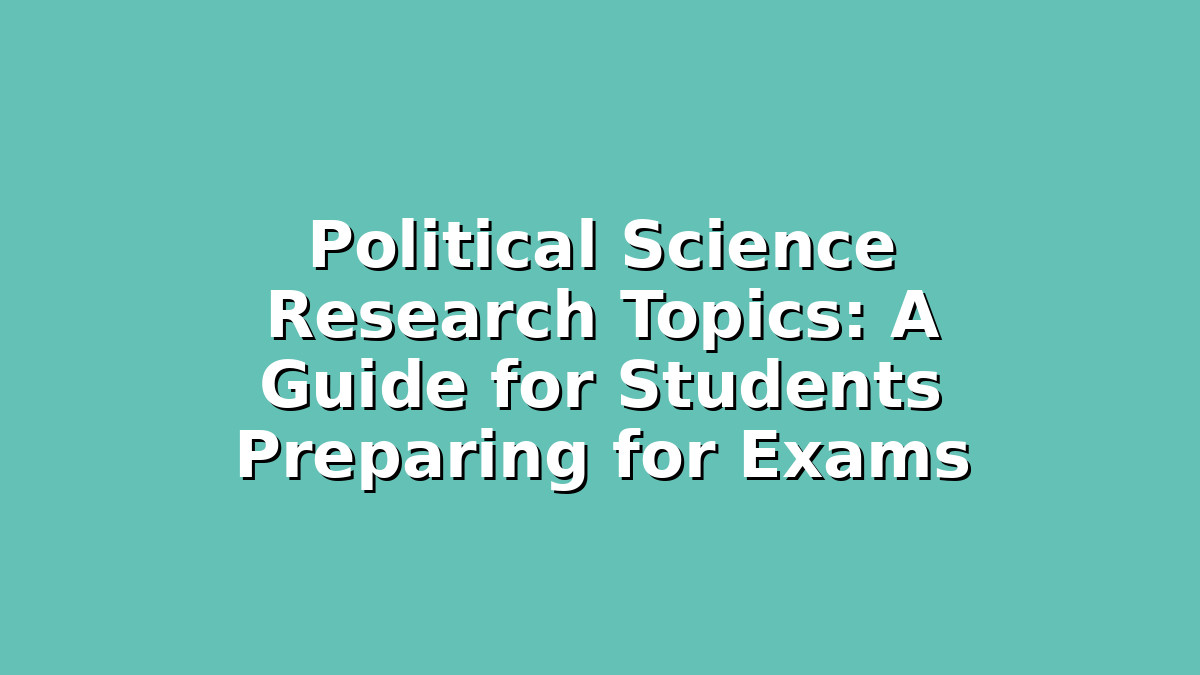Political science is a fascinating field that explores the systems, structures, and behaviors that shape governance and public policy worldwide. For students preparing for exams or working on research projects, selecting the right political science research topic can be both exciting and challenging. A well-chosen topic not only reflects your interests but also helps you engage deeply with course material and develop critical thinking skills. This guide will help you navigate the process of choosing research topics and offer study tips tailored to political science students.
Understanding the Scope of Political Science Research
Before diving into specific topics, it’s important to understand the broad areas that political science covers. Political science can be divided into several subfields, including:
– Comparative Politics: Comparing political systems, institutions, and processes across different countries.
– International Relations: Studying interactions between states, international organizations, and non-state actors.
– Political Theory: Examining ideas, philosophies, and ideologies behind political systems and behaviors.
– Public Policy and Administration: Analyzing the creation and implementation of government policies.
– Political Behavior: Investigating voter behavior, public opinion, and political communication.
Knowing these subfields will help you focus your research and select topics that align with your course objectives and personal interests.
Section 1: How to Choose Political Science Research Topics
Choosing a research topic can be overwhelming, especially with so many possibilities in political science. Here are some strategies to help you select a compelling and manageable topic:
1. Align with Your Interests: Reflect on the lectures, readings, and discussions that intrigued you most. Are you fascinated by international diplomacy or domestic politics? Choosing a topic you find engaging will keep you motivated during your exam preparation and research.
2. Consider the Scope and Depth: Avoid topics that are too broad, such as “Democracy,” which can be overwhelming to cover in a single paper. Instead, narrow it down to something more focused, like “The Impact of Social Media on Democratic Participation in India.”
3. Check Availability of Resources: Research requires credible sources such as academic journals, books, and reputable news outlets. Before finalizing your topic, ensure there is enough material available for you to explore.
4. Consult Your Professors or Peers: If you’re unsure or stuck, ask your instructor or classmates for input. They might suggest fresh perspectives or help refine your ideas.
5. Stay Current: Political science is dynamic. Topics related to current events or emerging trends—like cybersecurity in elections or climate policy negotiations—can be both relevant and rewarding.
Section 2: Study Tips for Political Science Students
Once you have your topic, the next step is effective study and research. Here are some study tips designed to help you excel in political science exams and research projects:
1. Organize Your Notes Thematically: Political science covers diverse topics. Organizing your notes by themes or subfields helps in better understanding and retention. Use tools like mind maps or digital apps (e.g., Notion, OneNote) to categorize information.
2. Engage with Primary and Secondary Sources: Primary sources include speeches, government documents, treaties, and interviews, while secondary sources analyze or interpret these documents. Engaging with both types will enrich your understanding and provide a balanced perspective.
3. Practice Critical Thinking: Political science isn’t just about memorizing facts; it’s about analyzing and interpreting political phenomena. When studying, ask yourself questions such as: Why did this event happen? What are the consequences? How do different theories explain this behavior?
4. Join Study Groups or Online Forums: Discussing topics with peers can deepen your understanding and expose you to diverse viewpoints. Platforms like Reddit’s r/PoliticalScience or university forums are great for this.
5. Use Past Exam Papers and Sample Questions: Familiarize yourself with exam formats and frequently asked questions. This will help you structure your answers and manage your time during exams.
Section 3: Popular Political Science Research Topics for Students
To spark your ideas, here are some popular and timely political science research topics organized by subfield:
#### Comparative Politics
– The rise of populism in Europe: Causes and consequences.
– Electoral systems and voter turnout: A comparative study of proportional representation vs. majoritarian systems.
– The role of authoritarian regimes in economic development: Case studies from China and Russia.
#### International Relations
– The impact of the United Nations in maintaining global peace since 1945.
– Cyber warfare and international security: Challenges and policy responses.
– The evolving role of China in global governance.
#### Political Theory
– The relevance of John Locke’s social contract theory in modern democracies.
– Feminist political theory and its impact on contemporary policy-making.
– The concept of justice in John Rawls’ theory compared to libertarian perspectives.
#### Public Policy and Administration
– Policy responses to climate change: Comparing strategies of developed and developing nations.
– The effectiveness of healthcare reforms in the United States post-Affordable Care Act.
– Public administration and corruption: Case studies from Latin America.
#### Political Behavior
– The influence of social media on youth political participation.
– Political polarization and media consumption patterns in the United States.
– Voting behavior among ethnic minorities in the UK.
While exploring these topics, remember that the best research comes from a blend of curiosity, critical analysis, and evidence-based arguments. Select a topic that challenges you but is also feasible within your time frame and resources.
Conclusion
Choosing the right political science research topic and preparing effectively for exams can significantly enhance your academic performance and deepen your understanding of the political world. By aligning your research with your interests, organizing your study materials intelligently, and engaging critically with content, you can develop insightful and impactful work. Remember, political science is not just about facts and figures—it’s about understanding how our societies function and how power shapes our lives. Stay curious, stay motivated, and use your research journey as an opportunity to grow both academically and personally.
Good luck with your studies!

Responses